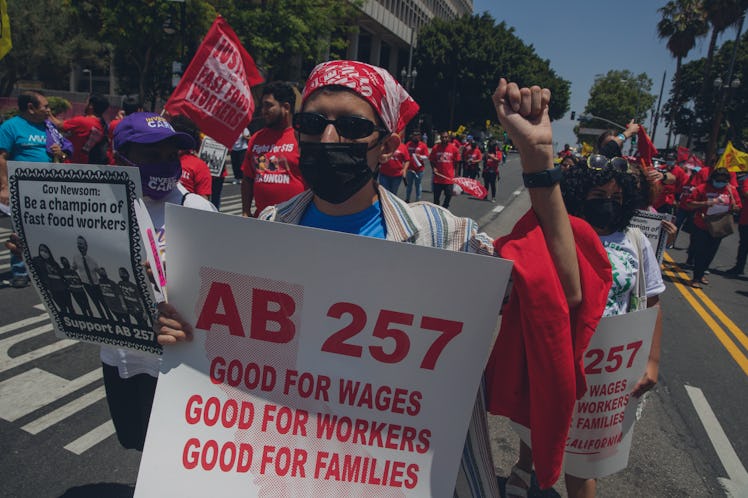This California Bill Could Dramatically Improve The Lives of Working Families
The FAST Act could change the working conditions of half a million food service workers in California. It could be just the start.

Members of California’s State Senate just passed a labor law that will allow fast food employees more say in their pay, work conditions, and hours — a huge win for the state’s 550,000 fast food workers. Known as the Fast Food Recovery Act, or the FAST Act, the bill now moves on to Governor Newsom’s desk, where analysts say it’s unclear whether he will sign it into law.
What Will The FAST Act Do?
If signed into law by Newsom, the FAST Act will allow for the establishment of a council comprised of fast food workers and their advocates as well as restaurant and franchise representatives to negotiate everything from salary to hours, a godsend for workers in an industry that has been plagued by wage theft, unsafe conditions, and sexual harassment.
The bill also provides for an hourly wage of up to $22 per hour for fast food workers, almost half of whom are over the age of 25 — a low-end living wage, especially for those with children, in one of the most expensive states in the country.
While it may sound like union organizing, the bill is actually more similar to a process called sectoral bargaining, where standards are set across an entire sector of industry instead of on a per company basis.
What Is Sectoral Organizing And Why Does It Matter?
Though this bill isn’t exactly sectoral bargaining, it’s very close to it. Traditional sectoral organizing is common in most European countries but is prohibited in the United States, where workers in many industries — particularly part-time and contract workers — are forced to accept not only exploitative business practices but also unsafe working conditions.
Unionization in the American sense has been difficult for fast food workers, which number more than three million nationwide and earn on average around $12.50 per hour. Many restaurants are franchises and not wholly corporate-owned, making negotiation difficult. Similarly, many U.S. companies are stringently anti-union and use veiled and overt threats to prevent employees from organizing for better working conditions and higher pay.
The FAST Act, in effect, would add a layer of protection between workers and corporate owners in the form of a council comprised of industry workers, corporate representatives, and state regulators to establish standards that would be implemented industry-wide in the state of California. But it could help fast food workers in other states, too.
Why This Bill Could Help Workers Nationwide
Restaurant lobbyists claim the bill will do more harm than good — spreading the idea that fast food workers should negotiate for better conditions and higher pay across the country.
“If passed, also expect to see similar legislation in states like New York, Oregon, Washington, Illinois, and more,” reads material from the National Restaurant Association regarding the bill. “The greatest chance for defeating this legislation is in the California Senate, making it imperative for the industry to focus its efforts there.”
Advocates, however, call the bill “the most important piece of labor law to pass in decades.”
Why Does Worker Power Matter For Families?
Numerous studies have shown that low wages and exploitative business practices are associated with poor outcomes for workers and their families — everything from infant mortality and mental health to adult lifespan is affected by low wages.
It’s also important to note that fast food workers are shift workers. For 23 million shift workers nationwide, a lack of consistent scheduling and other variables in the service industry can have long-term negative impacts not just on their children but also on their children’s children. Those negative impacts can harm the sleep schedule and regular routine of children, and workers of color are most affected by this. Having a team be able to negotiate hours — and potentially implement systems similar to fair work week laws or help people get consistent work — could help wages and families’ schedules a great deal.
Data from the University of California, Berkley shows that 20% of fast food workers live below the U.S. poverty line and that the majority of families of full-time fast food workers are enrolled in government assistance programs such as Medicaid and the Children’s Health Insurance Program. The FAST Act, by ensuring a living wage and safe workplaces, will improve outcomes for families across the state.
Despite the state's progressive tendencies, Governor Newsom’s signature is not a sure thing. His finance staff warned that enacting the bill into law could result in widespread legal and regulatory issues and raise costs across the restaurant industry.
This article was originally published on